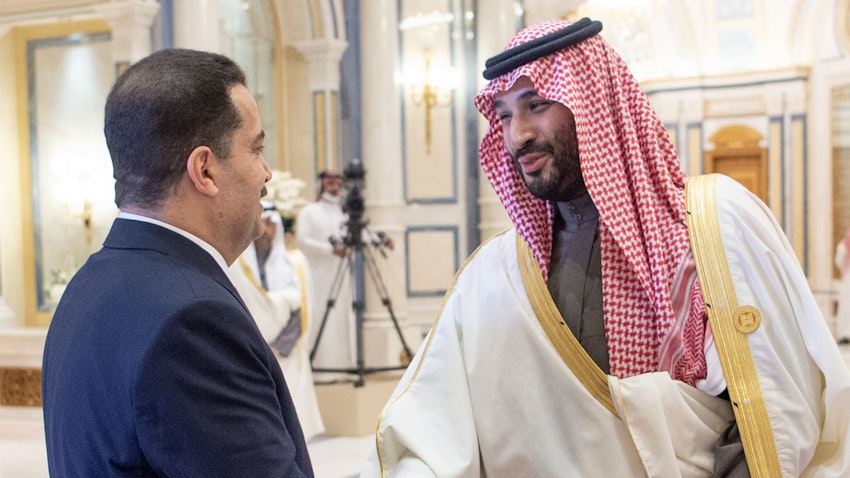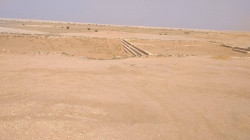Iraq-Saudi engagement weathers tumultuous regional climate

Shafaq News/ Amid growing regional tensions, Iraq has sought to strengthen relations with Saudi Arabia and advance its nascent economic ties with the Kingdom. The bilateral relationship was fraught for decades, sparked by former Iraqi president Saddam Hussein’s (1979-2003) invasion of Kuwait in 1990. This situation continued for well over a decade after the 2003 US-led invasion of Iraq, when Riyadh declined to send an ambassador to Baghdad.
But in recent years, the two neighbors have reached a level of diplomatic and economic rapprochement. This demonstrates the mutual commitment to strengthening regional stability, as well as ensuring the viability of development projects which are the product of the détente.
Notably, Iraq’s energy-related projects with Saudi Arabia and other Gulf Cooperation Council (GCC) member states have continued apace. This is despite being seen by many observers as part of a broader US-backed effort to wean Baghdad off its reliance on Iranian electricity and natural gas. The success of the projects between Iraq and Saudi Arabia—and Tehran’s apparent acquiescence—signal an Iranian nod to Baghdad’s central role in regional diplomacy.
Beginning in 2021, then-Iraqi prime minister Mustafa Al-Kadhimi (2020-22) hosted multiple rounds of diplomatic talks between Iranian and Saudi delegations. This culminated in the normalization accord between the Islamic Republic and the Kingdom that was announced in China in Mar. 2023, ending seven years of estrangement.
Iraq’s centrality for regional rapprochement
While successive Iraqi prime ministers sought to forge ties with Saudi Arabia after the downfall of the Ba’athist regime, Baghdad only formally resumed diplomatic relations with Riyadh in 2015, under Haidar Al-Abadi (2014–18). His successor as prime minister, Kadhimi, continued these efforts.
Seen as unbeholden to any regional power, Kadhimi was able to host several high-level meetings between senior Iranian and Arab officials during his term. However, despite these diplomatic successes, many GCC countries continued to view the close affiliations between the ruling Iraqi governing blocs and Tehran with suspicion. Riyadh nonetheless received several top Iraqi figures, including Hikmah Movement chief Ammar Al-Hakim in Aug. 2022.
Since entering office in Oct. 2022, incumbent Iraqi Prime Minister Muhammad Shia’ Al-Sudani has worked to continue engagement with neighboring Arab states. Having secured the premiership thanks to the Iran-backed Shiite Coordination Framework, Sudani was initially seen by GCC countries as pliant to Tehran’s interests. However, the Iraqi premier has shown an ability to utilize his close relationship with Iran while leveraging the diplomatic successes of his predecessor.
The Baghdad Conference for Cooperation and Partnership held in Dec. 2022 saw the participation of Saudi Foreign Minister Faisal bin Farhan Al Saud. Less than three months later, the Kingdom’s chief diplomat was back in Iraq. In parallel with Farhan’s visit, the Iraqi and Saudi interior ministers signed the first bilateral security agreement in 40 years, focused on normalizing border-related activities.
Last summer, the two countries also agreed on the construction of a new 1B USD shopping district in the Iraqi capital—the biggest in the country. ‘Baghdad Avenue’ revolves around more than 6,000 residential units along with shops, restaurants, and commercial offices. Moreover, as recently as Oct. 2023, Farhan was yet again received in Baghdad. On his part, Sudani visited the Kingdom in Dec. 2022 for multilateral summits gathering Arab leaders.
The realpolitik of rapprochement
The success of regional diplomatic initiatives has born fruit for the Iraqi economy. Commercial and trade ties between Baghdad and Riyadh have grown steadily in recent years, although a stark and stubborn trade imbalance has remained. Saudi exports of manufactured goods—which are in high demand in Iraq—totaled 3,371M SAR (900M USD) in 2020, while the Kingdom’s imports amounted to only 42M SAR (11M USD). This kind of imbalance is notably also seen in Iraq’s trade with other neighbors, such as Iran.
Iraq-Saudi exchanges have been further facilitated by the reopening of the Jadidat Arar crossing between the two countries in 2020. The border had largely remained closed since Iraq’s 1990 invasion of Kuwait. The reopening of Jadidat Arar is reported to have significantly increased commerce, with overland trade reaching 243M USD in the first half of 2023. The project has been noted as a turning point in bilateral relations, and hailed by observers as a success.
In an interview with Amwaj.media, Iraqi government advisor Mazhar Muhammad Salih affirmed that the reopening of the crossing “means that economic bridges between the two neighboring states are permanently established.”
There is more to the Iraqi-Saudi relationship than trade, however, as the two states share longstanding cultural and religious ties. The reopening of the border was at least initially intended to facilitate the Haj and Umrah pilgrimages, as well as for Saudi pilgrims to visit Iraqi religious sites.
However, Salih underscored to Amwaj.media that advancement towards broader joint investments remains slow. Doing so would demand a larger commitment by the political establishments in both Baghdad and Riyadh, such as convening a dedicated joint economic summit. Iraqi government adviser Salih noted that the rapprochement would “not be done justice if such projects remain at the level of commodity and services trade alone.”
Iraq seeks to diversify energy mix
The diplomacy between Iraq and Saudi Arabia has been accompanied by efforts to help diversify Baghdad’s energy portfolio. In a meeting on the sidelines of the 2022 Jeddah Security and Development Summit, Iraqi and Saudi delegations finalized an agreement for GCC countries to provide electricity to Iraq. The project, run through the Gulf Cooperation Council Interconnection Authority (GCCIA), will connect Iraq’s southern Basra Governorate to the power grids of neighboring Arab states. Last autumn, a related energy platform was also launched.
Baghdad is claimed by some observers to have agreed to supply the Kingdom with low-cost oil as payment for the electricity. However, Amwaj.media could not independently verify this claim.
The broader context for the GCCIA-Iraq project is regional and international concern over Baghdad’s ongoing reliance on Iranian energy. Despite its status as a major oil producer and exporter, Iraq has long been plagued by blackouts due to security challenges and subpar infrastructure. Approximately one-tenth of power supply is directly bought from Iran. Gas imports from Tehran also fuel local power plants that provide approximately one-third of national electricity output. Last year, Sudani charged that the bill for these imports amounts to some 4B USD annually, a reality that observers say the GCCIA project could help mitigate—even if only a little.
Importantly, Iraq’s imports of Iranian energy depend on exemptions from US secondary sanctions. This applies to payments, too. As a result of the Donald Trump administration’s 2018 exit from the 2015 Iran nuclear deal and reimposition of sanctions on Tehran, Iraqi energy imports were hit in 2018. Iranian gas exports decreased from 50M to 8.5M cubic meters per day, wreaking havoc on the Iraqi economy and fueling widespread popular anger.
Against this backdrop, the Trump administration began issuing sanctions waivers in late 2018. Since coming to power in Jan. 2021, the Joe Biden administration has also issued such exemptions. At the same time, Iran is believed to have on several occasions reduced its gas exports to Iraq as a means of pressuring Baghdad to settle the debts accumulated due to US sanctions.
Observers have argued that projects such as the GCCIA deal could offer longer-term solutions for Iraq. Economist Haidar Al-Rubaie has echoed broader calls for a shift away from reliance on Iran, arguing that closer collaboration with Gulf Arab states represents such a pathway forward. Speaking to Amwaj.media, Rubaie explained that “the [GCCIA] accord is a way to end Iraq’s need for Iranian gas and could represent a gateway for Iraq to enter the Gulf energy market.”
According to Rubaie, such projects offer “economic gains that contribute to alleviating the energy crisis in Iraq,” and may ultimately “facilitate the country securing its gas needs at competitive prices.” Further energy projects with Gulf Arab states could additionally help Iraq achieve the political stability it needs to further invest in its own domestic natural resource production. Despite ongoing regional tension, the successes of these projects cannot be understated, and all parties seem likely to push for their continuation.
(Amwaj Media)
